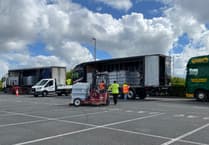A MAJOR project to safeguard an endangered fish which only breeds in the upper reaches of the River Tamar has been questioned.
South West Water (SWW) has announced a £1m plan to build a physical barrier to slow down the water at Gunnislake Weir, allowing the fish to spawn and safeguard the breeding habitat and population.
Populations of the allis shad (herring type) fish in the UK have declined due to overfishing, pollution and habitat destruction.
However, the price tag has raised questions over the priorities of SWW while locals protest at the high levels of pollution. Figures released by the Environment Agency show South West Water discharged 19 hours of sewage a day into the River Tamar in Calstock Parish last year. Although this is a reduction on the previous year from sewage outfalls in Calstock, Chilsworthy and Gunnislake, this is still unacceptable say campaigners.
Cllr Mike Greenwood, of Calstock Parish Council, said: ‘The council hasn’t looked at this scheme yet, but we will be meeting to mdiscuss this plan.
‘However, at at £1m it does sound rather an expensive scheme. We’re all for supporting the precious ecology of the Tamar Valley and understand the value of the Tamar habitats. But it does make me question the priorities of South West Water when so much pollution is being poured into the Tamar from sewage outfalls. Surely there’s more of a threat to the shad from the pollution than the speed of the flow.’
SWW is aiming to submit a planning application later this year. Once approved, construction works would commence on site in spring 2024 with the new fish pass completed by March 2025.
SWW said it has a legal commitment to deliver investment to improve environmental outcomes via the Water Industry National Environment Programme (WINEP). Measures are developed in consultation with the Environment Agency.
A SWW spokesperson said: ‘South West Water is proposing to construct a new fish pass at Gunnislake Weir to support the passage of all fish upstream beyond the weir.
‘The project will improve the UK’s only known spawning ground for allis shad, a highly protected species of fish.
‘The new passage will enable allis shad to migrate upstream to spawn, along with smelt, trout, salmon and eels. South West Water has a legal commitment to construct the new fish pass under the Water Industry National Environment Programme, following consultation with the Environment Agency.’
During the construction phase, every effort will be made to ensure that the existing habitat is protected.
A construction environmental management plan (CEMP) will outline key mitigation measures and will be adhered to throughout the construction phase.
A temporary fish pass will be in place throughout the construction works. It will be located directly adjacent to the existing fish pass, on the weir.
Natural England explained that allis shad (alosa alosa) is a migratory (anadromous) fish species of the herring family which matures in the sea and migrates to freshwater to spawn.
Though once widespread around the UK, allis shad populations have declined significantly in recent decades and the River Tamar is now the only known spawning site in the UK for the species.
The Tamar estuary is within the Plymouth Sound and Estuaries Special Area of Conservation (SAC), where allis shad is a designated species.
Previous studies have shown that allis shad routinely spawn in the tidal reaches of the upper Tamar estuary, an observation unique to the Tamar.
Natural England commissioned a survey of available allis shad spawning habitat on the Tamar and monitoring of the timing and location of allis shad spawning.
The detailed study undertaken by the Environment Agency has led to improved understanding of spawning habitat availability and use within the Tamar.





Comments
This article has no comments yet. Be the first to leave a comment.